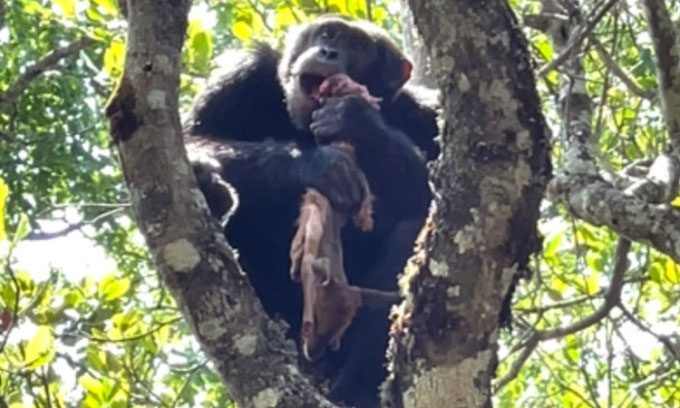An eagle in the Issa Valley, western Tanzania, faced a challenging meal when the dominant male chimpanzee suddenly dashed out and stole its prey.

Chimpanzee Imba eating a stolen antelope carcass from the eagle. (Photo: Sam Baker/GMERC).
Chimpanzees (Pan troglodytes) primarily eat vegetation, but their diet also includes meat and various animal products. They actively seek out meat and occasionally consume carrion. Recent research published in the journal Primates reveals their ability to confront other predators and steal food from them, a behavior known as confrontational scavenging, as reported by Live Science on December 5.
Lead researcher Sam Baker, coordinator of the Bugoma Primate Conservation Project in Uganda, was following a group of chimpanzees with local field assistant Kidosi Raulent Mfaume when they spotted the dominant male named Imba rushing into a tall grass area. Shortly after, an African crowned eagle (Stephanoaetus coronatus) took flight. Moments later, Imba emerged with an immobile bushbuck (Tragelaphus scriptus), which the research team hypothesized was caught by the eagle. “Such confrontations are very rare, mostly based on speculation, so an almost complete observation like this is extremely unique,” Baker shared.
Other chimpanzees attempted to steal the carcass and sought a share from Imba for about an hour. He shared food with one female chimpanzee and consumed most of it alone. After discarding the carcass, the remaining chimpanzees came to eat until only the skull was left.
This is the second example of chimpanzees stealing food from raptors. Most cases of confrontational scavenging usually involve chimpanzees taking prey from baboons. A study published in 2019 in the journal Human Evolution found that chimpanzees also steal prey from leopards (Panthera pardus), even though leopards often hunt chimpanzees. As chimpanzees are among the closest relatives to humans, they can provide insights into the lives of our common ancestors who lived around 6 to 8 million years ago and the evolution of human behavior.


















































